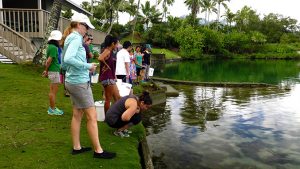In 2018, the University of Hawaiʻi at Mānoa College of Education began offering the first ethnomathematics graduate certificate and became the first academic program in ethnomathematics in the world. Later that year, the Hawaiʻi Teacher Standards Board approved ethnomathematics as a field of licensure.
“I think it’s fantastic that the Hawaiʻi Teachers Standards Board has added ethnomathematics as a field, because it just validates everything that we’re doing,” said Jaqueline Vallejo-San Agustin, a Hawaiʻi Technology Academy teacher. “It emphasizes the importance of integrating culture in our school curricula, especially in math, which is a subject that culture isn’t really seen in.”

For more than a decade, UH had been developing dynamic mathematics educators through ethnomathematics training, which provides hands-on experiences such as sailing aboard the the Polynesian Voyaging Society’s double-hulled canoes Hikianalia and Hōkūleʻa and traveling to the Hawaiʻi Institute of Marine Biology on Moku o Loʻe, also known as Coconut Island, in Kāneʻohe Bay to study snapping shrimp and other creatures in the algae participants collect.
Ethnomathematics is a way to prepare high-quality primary and secondary teachers as leaders through real-world application of teaching and learning mathematics that bridges indigenous wisdom and 21st century skills to classrooms and communities.
Vallejo-San Agustin says, “Ethnomathematics is just the way we should be teaching mathematics. By using culture, by going into our physical environments and just by doing instead of just listening and lecturing.”
Being first in the world means UH Mānoa is leading the way for math education. Ferdinando Arzarello, former president of the International Commission on Mathematical Instruction says, “[UH’s] program is very important because it’s opening new ways for research in math education, for research in science, for research that is looked at from a fresher standpoint.”
Hawaiʻi Community College biology Instructor Michelle Phillips says she’s seen ethnomathematics change students. “It’s made a huge difference. I’ve been involved in this program since 2015, so I’ve seen students go from listening to lectures to actually getting involved to wanting to make a difference in their community,” she said.
The ethnomathematics program at UH Mānoa’s College of Education is the culmination of more than 10 years of building the UH Ethnomathematics and STEM Institute, under the direction of Professor of Mathematics Education Linda Furuto, with support from state and federal funding.
Furuto said, “The future vision of the ethnomathematics program is to strive to be a model for how we learn and teach mathematics that honors all people and places, and to be a catalyst for positive change in the communities we’re endeavoring to serve in Hawaiʻi and around the world.”
For more information on the UH Mānoa College of Education’s Ethnomathematics Program or to apply go to the program website.
—By Kelli Trifonovitch

